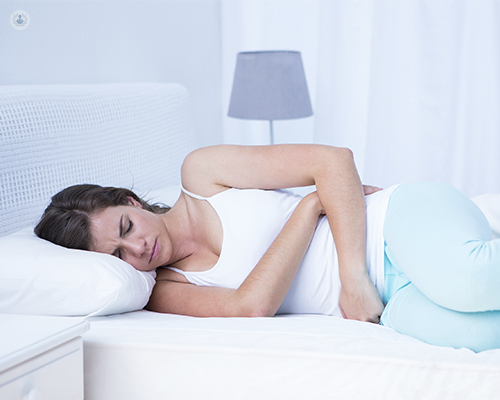Is bloating ever serious
Autore:Bloating is a common condition and only very rarely is a sign of something serious, but do you know when to seek a specialist for advice? Dr John Martin, a gastroenterologist, explains the causes of bloating so that you know when to seek medical help.

What is a bloated stomach?
A bloated stomach is a sensation that is often attributed to excessive gas or air. This perception may result from a small increase in gas, often caused by eating certain foods such as those containing lactose or other indigestible components. Often, however, the perception of excessive gas is the result of an increase in the sensitivity of the intestine to either normal amounts, or only a small increase in the amount of gas.
Posture can be also a cause of bloating and distension. Relaxation of the abdominal muscles combined with abnormal descent of the diaphragm can result in a decrease in the intra-abdominal volume and distension of the abdomen.
Which conditions could be causing a bloated stomach?
The commonest causes of bloating are:
- Irritable bowel syndrome (IBS )
- Constipation
- Food intolerances, to substances such as lactose
- Coeliac disease, an immune reaction to gluten
- Obesity
More serious causes can include:
- Bowel obstruction
- Abnormal growth of bacteria in the small bowel
- Accumulation of fluid
- Benign or malignant tumours
- In women, ovarian cancer is a rare cause of bloating
What signs and symptoms indicate that you need to see a doctor?
Bloating can be a troublesome symptom, so even if it does not represent a serious problem it is worth consulting a gastroenterologist, as there are often treatments that will help the symptoms. In rare cases when bloating has a serious cause, then the following symptoms may be present, and you should seek urgent advice.
- Severe pain
- Vomiting
- Weight loss
- A change in bowel habit, in particular diarrhoea or rectal bleeding
How will they find out what the cause is?
Often a diagnosis is made from a patient’s medical history and tests aren’t needed at all. A gastroenterologist may recommend blood tests to detect coeliac disease, a breath test to look for bacterial overgrowth or an intolerance to lactose, and possibly a scan of the abdomen or pelvis to detect tumours or fluid. Very rarely are endoscopic tests used.
What treatments are available?
- Dietary modifications such as a reduction in carbonated drinks, avoidance of dairy products, or a low FODMAP diet
- Treatment of the underlying cause, such as antibiotics for bacterial overgrowth or a gluten-free diet in patients with coeliac disease
- Biofeedback therapy to retrain patients’ contraction of the abdominal muscles and control of the diaphragm
- Other common treatments such as charcoal or probiotics may be useful in some patients but are often ineffective
Dr John Martin has 25 years of experience managing all aspects of gastroenterology. Visit his profile to learn more and to book your consultation.


